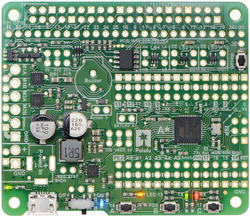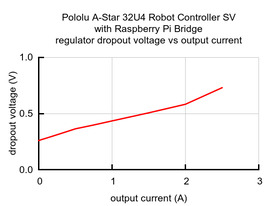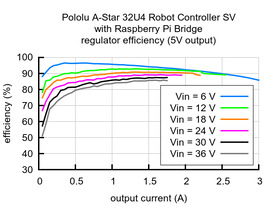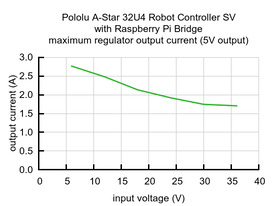Support » Pololu A-Star 32U4 Robot Controller User’s Guide » 3. A-Star 32U4 Robot Controller with Raspberry Pi Bridge »
3.7. SV regulator
 |
The A-Star 32U4 Robot Controller SV can be powered from a 5.5 V to 36 V external source. The input voltage is regulated to 5 V by an MP4423H switching step-down (buck) converter from Monolithic Power Systems. (We also make a standalone regulator based on this integrated circuit.)
As shown in the left graph below, the SV’s switching regulator has an efficiency – defined as (Power out)/(Power in) – of 80% to 95% for most combinations of input voltage and load.
|
|
The A-Star’s components, including the microcontroller and LEDs, draw 30 mA to 40 mA in typical applications (without the buzzer). The rest of the regulator’s achievable output current, which depends on input voltage as well as ambient conditions, can be used to power other devices; this can include an attached Raspberry Pi (which typically draws a few hundred milliamps). The right graph above shows the output currents where the regulator’s output voltage drops below 4.75 V. These currents are close to the limits of the regulator’s capability and generally cannot be sustained for long periods; under typical operating conditions, a safe limit for the maximum continuous regulator output current is 60% to 70% of the values shown in the graph.
The dropout voltage of a step-down regulator is defined as the minimum amount by which the input voltage much exceed the regulator’s target output voltage in order to assure the target output can be achieved. As can be seen in the graph below, the dropout voltage of the Robot Controller SV’s regulator increases approximately linearly with the output current. For light loads where the dropout voltage is small, the board can operate almost down to 5 V. However, for larger loads, the dropout voltage should be taken into consideration when selecting a power supply; operating above 6 V will ensure the full output current is available.
 |
Typical dropout voltage of the 5 V regulator on the A-Star 32U4 Robot Controller SV with Raspberry Pi Bridge. |
|---|
Note: Although the MP4423H is rated for a maximum operating input voltage of 36 V, it is not appropriate to power the Robot Controller SV with a 36 V battery, as battery voltages can be much higher than nominal voltages when they are charged. The maximum nominal battery voltage we recommend is 24 V, and if you approach that limit, you should take extra precautions to prevent LC voltage spikes from damaging the board (see this application note for more information). A good practice is to ensure that the A-Star’s power switch is off before connecting it to a voltage source.








